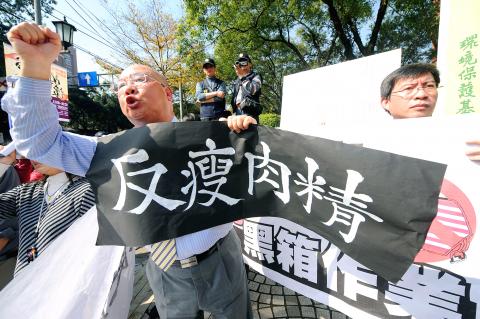|
Expert questions
transparency of US beef meetings
By Shih Hsiu-chuan / Staff Reporter

Protesters hold banners reading
¡§No to leanness-enhancing agents¡¨ and ¡§No closed-door deals¡¨ outside the Council
of Agriculture in Taipei yesterday after they were excluded from an
inter-ministerial meeting about US beef and the feed additive ractopamine.
Photo: CNA

An activist shouts slogans in
front of an anti-US beef sign during a protest in front of the Council of
Agriculture in Taipei yesterday. The protest was held as an inter-ministerial
meeting on the ractopamine ban was discussed.
Photo: Pichi Chuang, Reuters
An expert who had been invited to give his
views at an inter-ministerial meeting on the issue of US beef imports yesterday
left about 10 minutes after the meeting began, saying that the process was not
transparent.
Chou Chin-cheng (©P®Ê¼á), dean and chairman of the Institute of Veterinary Clinical
Science at National Taiwan University¡¦s School of Veterinary Medicine, walked
out of the meeting ¡X the second to be held on the controversy surrounding
ractopamine residue in US beef imports ¡X after his request that the Council of
Agriculture make the transcripts of the meeting public was rejected.
¡§The government has to publicize all the information it bases its decisions on,
regardless of whether the information is correct or incorrect,¡¨ Chou told
reporters.
He said he was the only participant who wanted the council to provide either a
transcript or video of the meeting to the public.
If the government really welcomes various opinions, the different views
expressed in the meeting should be made public ¡X not just the conclusions, Chou
said.
Chou said he would attend the next committee meeting if invited, but would again
insist that the discussions be made public.
At a press conference afterward, Council of Agriculture Deputy Minister Hu Sing-hwa
(J¿³µØ) said a majority of the participants were in favor of a closed-door meeting
and opposed the release of a transcript so they could speak freely.
Democratic Progressive Party Legislator Tien Chiu-chin (¥Ð¬îÔ») and Taiwan
Solidarity Union Legislator Lin Shih-chia (ªL¥@¹Å) led about 30 people from nine
civic groups in a small protest outside the council¡¦s headquarters as the
meeting was being held.
¡§We have three demands. First, as the issue is a public health matter, there is
no room for compromise with the US. Second, the council has to open all of its
meeting records for public inspection. Third, the committee should be
reshuffled,¡¨ Homemakers¡¦ Union and Foundation chairperson Chen Man-li (³¯°ÒÄR)
said.
While the first meeting on the issue was criticized for being one-sided, several
experts from the private sector who oppose the use of ractopamine in animal feed
were invited to yesterday¡¦s meeting, although they were in the minority.
Premier Sean Chen said the government would intensify its efforts to enforce
control measures on feed additives.
His comments came after reports that traces of ractopamine residue had been
found in US beef products in the local market.
The government could increase the inspection rate on US beef imports or revoke
licenses from importers that fail to enforce restrictions on US beef imports
that contain ractopamine residue, Chen said.
His comments came after some hypermarket chains, including Carrefour, RT-Mart
and A-Mart, temporarily removed US beef products from their shelves after the
products were found to contain traces of ractopamine.
¡§The use of beta-agonists [like ractopamine] is still banned. Sale of any meat
which contains the substance is illegal.¡¨ the premier said.
Importers found violating the regulation would be subject to higher border
inspection rates or could have import permits revoked,¡¨ he said.
Under pressure from Washington, where research has shown that ractopamine, a
leanness-promoting agent, is used in the raising of 45 percent of US pigs and 30
percent of ration-fed cattle, the government has resigned itself to considering
lifting the ban.
It is holding a series of inter-ministerial committee meetings to address the
issue and set up a task force to re-examine the health risks surrounding
ractopamine.
The moves have ignited consumer concerns over the safety of US beef. Local
authorities recently began testing samples of US beef sold at hypermarkets to
ascertain whether residue from drugs banned in Taiwan could be detected.
Two samples of US beef sold at RT-Mart and Carrefour in Taipei were found to
have ractopamine residue, among a total of six items tested; in Greater
Kaohsiung, traces of ractopamine were found in three of six items sold at
Dollars and RT-Mart.
Kung Tsau-lien (¾d±m½¬), a representative of RT-Mart, said that all US beef
products sold by the company were accompanied with certificates of export and
certificates of quarantine from the US, as well as certificates of compliance
issued by the Department of Health and the Council of Agriculture.
¡§It seems that [the certificates] were not enough,¡¨ Kung said.
Carrefour public relations manager Ho Mo-chen (¦óÀq¯u) said the company had pulled
all US beef products from shelves and referred the products for testing.
¡§To safeguard consumers¡¦ interest, we would not put them on the shelves unless
they are assured it is ractopamine-free,¡¨ she said.
Additional reporting by CNA
|
![]()
![]()
![]()